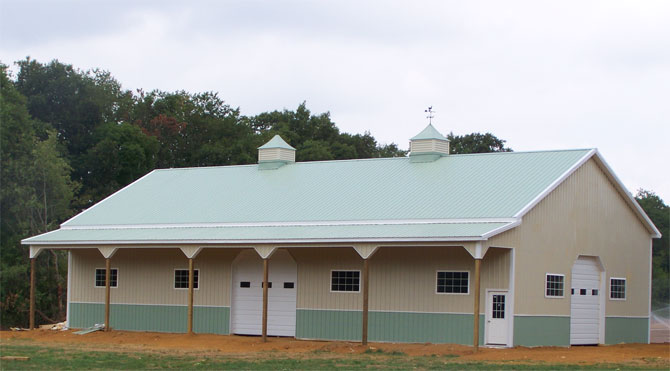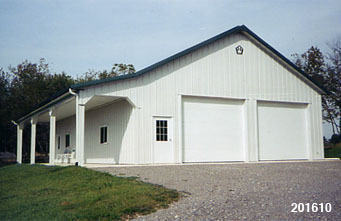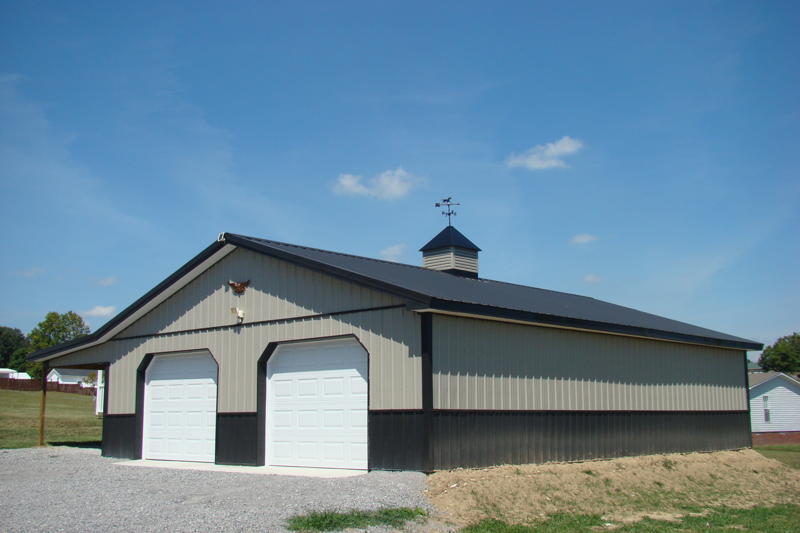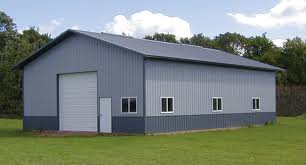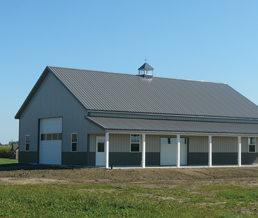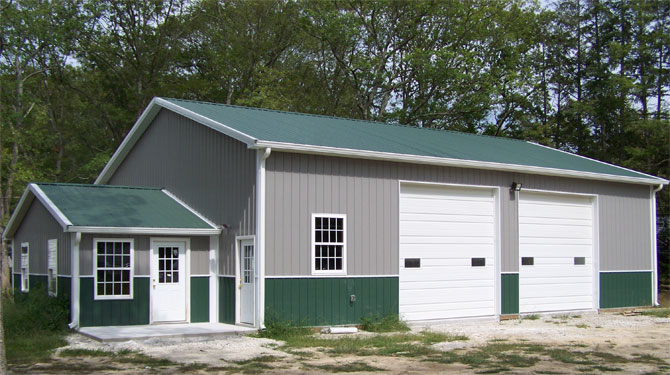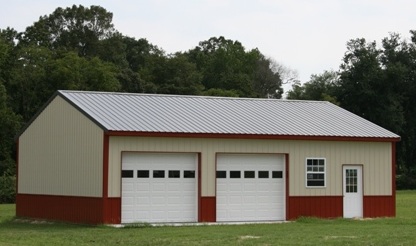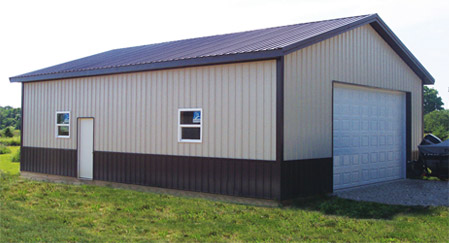US Metal Garages
Pole Barn Kits Michigan | Pole Buildings Michigan MI
We now carry Michigan MI pole barn kits. We carry Michigan MI pole buildings in many different sizes. Our metal pole barns come standard with 14 ga framing with available 12 gauge at an additional cost! Also our sheet metal comes standard with 29 gauge with 26 gauge available at an additional cost. Our sheeting is available in 13 different colors. Our Michigan MI pole barns are great for agricultural, commercial and livestock! Our all toll free 1-877-662-9060 for more information!
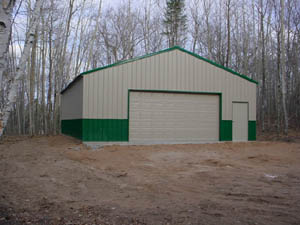
Call toll free: 1-877-662-9060
Email us: sales@mayberrymetalstructures.com
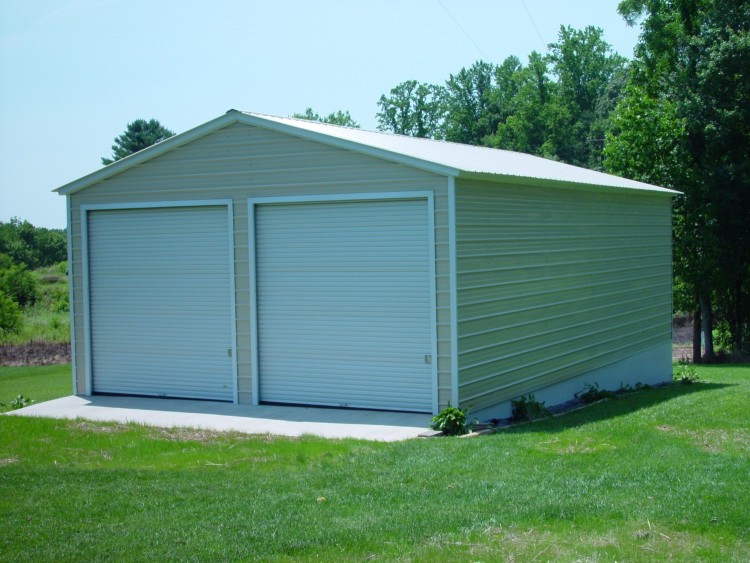
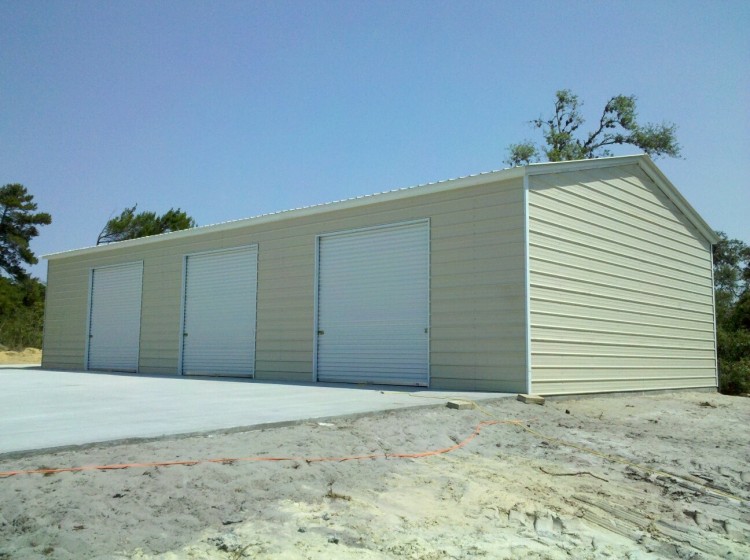
24x40x11 Vertical Roof Garage
With: (3) 10'x10' Garage Doors
(1) 36"x80" Walk in Door
24x30x11 Vertical Roof Garage
With: (2) 10'x10' Garage Doors
(1) 36" Walk in Door
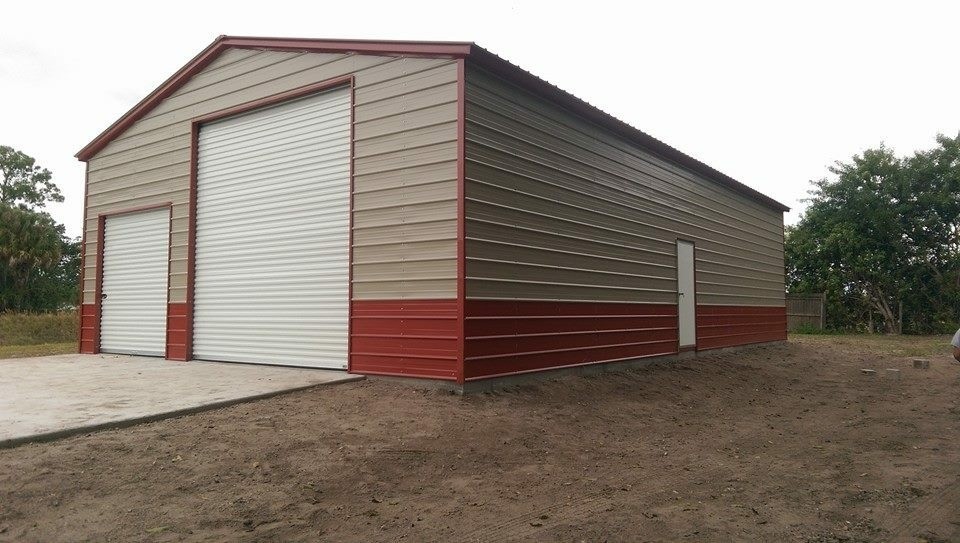
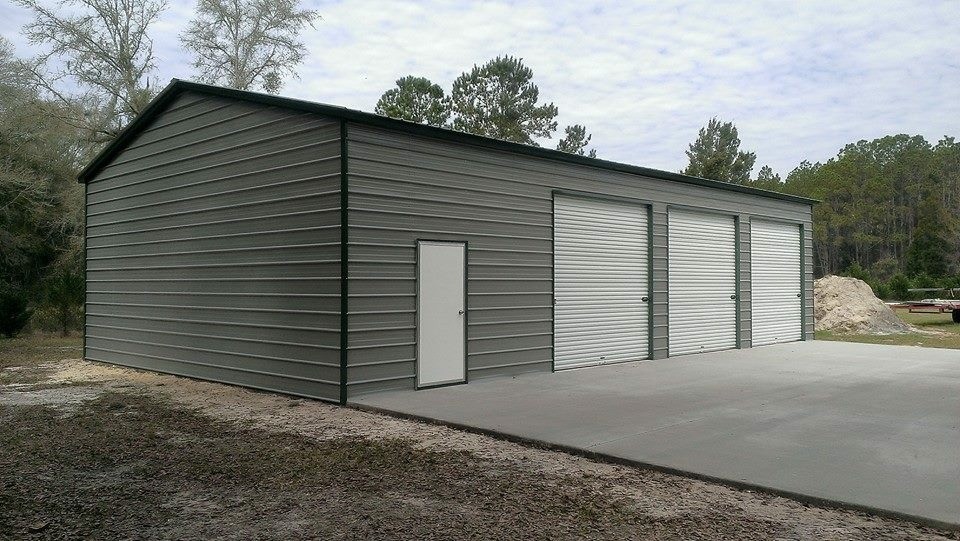
1-877-662-9060
24x45x12 Vertical Roof Garage
with: (3) 10'x10' Garage Doors
(1) 36" Walk in Door
24x40x12 Vertical Roof Garage
with: (1) 10'x10' Garage Door
(1) 6'x6' Garage Door
(1) 36" Walk in Door
1-877-662-9060
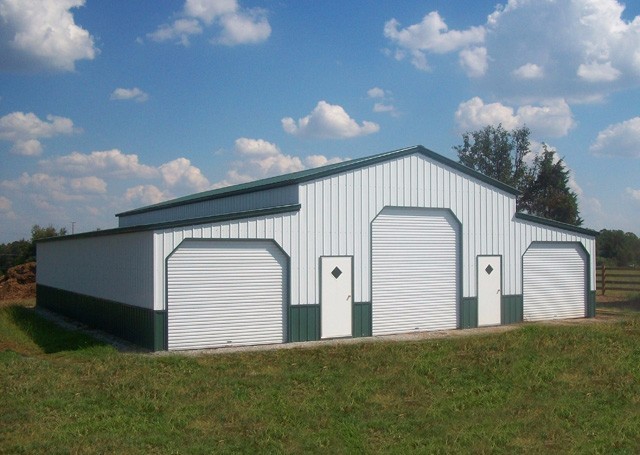
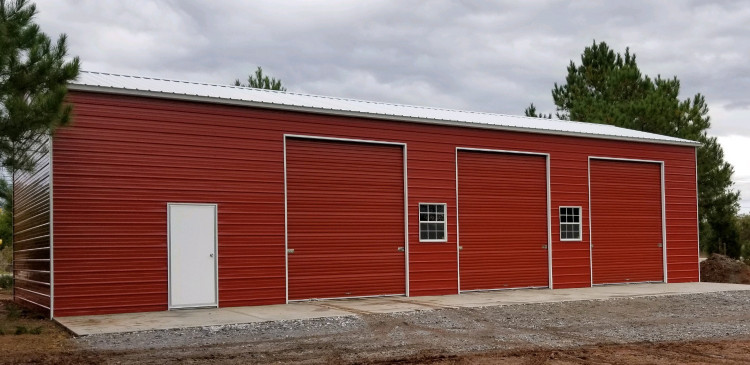
48x40x14&10 All Vertical Carolina Barn
12 & 24 & 12
30x50x12 Vertical Roof Garage
with: (3) 10'x10' Garage Doors
(1) 36"x80" Walk in Door
(2) Windows
1-877-662-9060
We sell to most of Michigan including the following cities:
Ada MI, Adrian MI, Albion MI, Algonac MI, Allegan MI, Allendale MI, Allen Park MI, Alma MI, Almont MI, Ann Arbor MI, Argentine MI, Armada MI, Auburn Hills MI, Bangor MI, Barron Lake MI, Battle Creek MI, Beadle Lake MI, Beecher MI, Beechwood MI, Belding MI, Belleville MI, Benton Harbor MI, Benton Heights MI, Berkley MI, Berrien Springs MI, Bertrand MI, Beverly Hills MI, Birch Run MI, Birmingham MI, Blissfield MI, Bloomfield MI, Bloomfield Hills MI, Bridgeport MI, Bridgman MI, Brighton MI, Bronson MI, Brownlee Park MI, Brownstown MI, Buchanan MI, Burton MI, Byron Center MI, Canton MI, Capac MI, Carleton MI, Cascade MI, Cassopolis MI, Cedar Springs MI, Center Line MI, Centreville MI, Charlotte MI, Chelsea MI, Chesanning MI, Chesterfield MI, Clawson MI, Clinton MI, Clio MI, Cloverville MI, Coldwater MI, Coloma MI, Commerce MI, Comstock MI, Comstock Park MI, Constantine MI, Coopersville MI,Corunna MI, Croswell MI, Cutlerville MI, Davison MI, Dearborn MI, Dearborn Heights MI, Decatur MI, Detroit MI, De Witt MI, Dexter MI, Dorr MI, Dowagiac MI, Dundee MI, Durand MI, East Grand Rapids MI, East Lansing MI, Eastpointe MI, Eaton Rapids MI, Ecorse MI, Farmington Hills MI, Ferndale MI, Ferrysburg MI, Flat Rock MI, Flint MI, Flushing MI, Forest Hills MI, Fowlerville MI, Frankenmuth MI, Franklin MI, Fraser MI, Galesburg MI, Garden City MI, Genesee MI, Gibraltar MI, Grand Blanc MI, Grand Haven MI, Grand Ledge MI, Grand Rapids MI, Grandville MI, Greenville MI, Gross Ile MI, Gross Pointe MI, Gross Pointe Farms MI, Gross Pointe Park MI, Gross Pointe Woods MI, Hamtramck MI, Harper Woods MI, Hartford MI, Haslett MI, Hastings MI, Hazel Park MI, Highland Park MI, Hillsdale MI, Holland MI, Holly MI, Holt MI, Homer MI, Howard City MI, Howell MI, Hudson MI, Hudsonville MI, Imlay City MI, Inkster MI, Ionia MI, Ithaca MI, Jackson MI, Jenison MI, Jonesville MI, Kalamazoo MI, Kent City MI, Kentwood MI, Lake Fenton MI, Lake Odessa MI, Lake Orion MI, Lambertville MI, Lansing MI, Lapeer MI, Lathrup Village MI, Lawton MI, Leslie MI, Level Park MI, Lincoln Park MI, Linden MI, Livonia MI, Lowell MI, Madison Heights MI, Manchester MI, Marine City MI, Marlette MI, Marshall MI, Marysville MI, Mason MI, Mattawan MI, Melvindale MI, Michigan Center MI, Middleville MI, Milford MI, Monroe MI, Montrose MI, Morenci MI, Mount Clemens MI, Mount Morris MI, Muskegon MI, Muskegon Heights MI, Nashville MI, New Baltimore MI, New Buffalo MI, New Haven MI, Niles MI, North Muskegon MI, Northville MI, Novi MI, Oak Park MI, Okemos MI, Olivet MI, Orchard Lake MI, Ortonville MI, Oshtemo MI, Otsego MI, Owosso MI, Oxford MI, Parchment MI, Paw Paw MI, Paw Paw Lake MI, Pearl Beach MI, Perry MI, Pinckney MI, Plainwell MI, Pleasant Ridge MI, Plymouth MI, Pontiac MI, Portage MI, Portland MI, Potterville MI, Quincy MI, Redford MI, Richmond MI, River Rouge MI, Riverview MI, Rochester MI, Rochester Hills MI, Rockford MI, Rockwood MI, Romeo MI, Romulus MI, Roosevelt Park MI, Roseville MI, Royal Oak MI, Saint Charles MI, Saint Clair MI, Saint Johns MI, Saint Joseph MI, Saline MI, Schoolcraft MI, Southfield MI, Southgate MI, South Haven MI, South Lyon MI, South Rockwood MI, Sparta MI, Spring Arbor MI, Springfield MI, Spring Lake MI, Stanton MI, Sterling Heights MI, Sturgis MI, Swartz Creek MI, Sylvan Lake MI, Taylor MI, Tecumseh MI, Temperance MI, Three Oaks MI, Three Rivers MI, Trenton MI, Troy MI, Union City MI, Union Lake MI, Utica MI, Vandercook Lake MI, Vicksburg MI, Walker MI, Walled Lake MI, Warren MI, Washington MI, Waterford MI, Watervliet MI, Wayland MI, Wayne MI, Webberville MI, West Bloomfield MI, Westland MI, White Pigeon MI, Whitmore Lake MI, Williamston MI, Wixom MI, Wolf Lake MI, Woodhaven MI, Wyandotte MI, Wyoming MI, Yale MI, Ypsilanti MI and Zeeland MI!
Selecting the right materials for your pole barn
Choosing the right materials for your pole barn in Michigan is crucial to ensuring its durability, longevity, and overall performance. Each component of the structure, from the foundation to the roofing, plays a vital role in the integrity and functionality of the building.
When it comes to the foundation, it's essential to select materials that can withstand the unique soil conditions and environmental challenges found in Michigan. Concrete is a popular choice, as it provides a stable and level base for the pole barn. Alternatively, you may consider using a pier and beam foundation, which can be particularly useful in areas with poor soil or high water tables.
The selection of the poles, or posts, is another critical decision. In Michigan, pressure-treated wood is a common and reliable choice, as it is resistant to rot, insects, and the elements. However, you may also consider alternative materials, such as steel or concrete, which can offer additional strength and longevity.
The walls and siding of your pole barn can be constructed using a variety of materials, including metal, wood, or a combination of both. Metal siding, such as galvanized steel or aluminum, is a popular option due to its durability, low maintenance, and resistance to weather conditions. Wooden siding, on the other hand, can provide a more traditional or rustic aesthetic, but may require more ongoing care and maintenance.
The roof of your pole barn is another crucial component that requires careful consideration. In Michigan, where heavy snowfall and severe storms are common, a durable and weather-resistant roofing material is essential. Metal roofing, such as steel or aluminum, is a popular choice for its strength, longevity, and ability to withstand the elements. Alternatively, you may opt for asphalt shingles or even a more specialized roofing system, such as a standing seam metal roof.
Building permits and regulations in Michigan for pole barns
When it comes to constructing a pole barn in Michigan, it's essential to familiarize yourself with the local building permits and regulations. These requirements can vary depending on the location, the size and intended use of the structure, and other factors. Failure to comply with the necessary permits and regulations can result in delays, fines, or even the need to make costly modifications to your pole barn project.
At the state level, Michigan has specific regulations governing the construction of pole barns and other agricultural buildings. These regulations cover a range of aspects, including the minimum size requirements, structural integrity, and safety standards. It's crucial to review these state-level regulations to ensure that your pole barn design and construction plans are in full compliance.
In addition to the state-level requirements, many local municipalities in Michigan have their own zoning and building codes that apply to pole barn construction. These local regulations may include restrictions on the placement of the structure, the maximum height or size, and any necessary setbacks from property lines or other structures. It's essential to research the specific requirements of the city or county where your pole barn will be located and obtain the necessary permits before beginning construction.
To navigate the permitting process effectively, it's often helpful to consult with local building authorities or a professional contractor who is familiar with the regulations in your area. They can provide guidance on the required permits, the necessary documentation, and any inspections or approvals that may be necessary throughout the construction process. By adhering to the building permits and regulations, you can ensure that your pole barn project is completed in compliance with all applicable laws and standards.
When it comes to building a pole barn in Michigan, hiring a professional contractor can be a wise investment that can save you time, money, and headaches in the long run. Experienced contractors have the knowledge, skills, and resources necessary to navigate the complexities of pole barn construction, ensuring that your project is completed efficiently and to the highest standards.
One of the primary benefits of working with a professional contractor is their familiarity with the local building codes, permits, and regulations. They can guide you through the necessary paperwork, handle all the required inspections, and ensure that your pole barn is constructed in full compliance with the law. This can help you avoid costly delays or potential issues down the line.
In addition to their expertise in navigating the bureaucratic aspects of the project, professional contractors also bring a wealth of practical experience to the table. They have a deep understanding of the best construction techniques, materials, and tools to use for pole barn projects in Michigan. This knowledge can translate into a more durable, efficient, and aesthetically pleasing final product.
When selecting a professional contractor for your pole barn project, it's essential to do your due diligence. Look for contractors with a proven track record of success in building pole barns in your local area. Check their licenses, insurance, and references to ensure that they have the necessary qualifications and a reputation for quality work. Additionally, be sure to get multiple quotes and compare the scope of services, timelines, and costs to find the best fit for your project.
Maintaining and caring for your pole barn in Michigan is crucial to ensuring its longevity, functionality, and aesthetic appeal. Regular maintenance and upkeep can help prevent costly repairs, extend the lifespan of your structure, and keep it looking its best for years to come.
One of the most important maintenance tasks for a pole barn is regularly inspecting the structure for any signs of wear or damage. This includes checking the condition of the poles, the walls, the roof, and any other components. Look for cracks, rot, rust, or any other issues that may require attention. Addressing these problems promptly can help prevent them from escalating into larger, more expensive problems.
Proper cleaning and preventative treatments are also essential for maintaining your pole barn. Regularly cleaning the exterior of the structure, including the siding and roof, can help remove dirt, debris, and any buildup that can lead to deterioration. Additionally, applying protective coatings, such as sealants or paint, can help safeguard the materials from the elements and extend their lifespan.
For the interior of your pole barn, maintaining cleanliness and organization is crucial. Regularly sweeping, dusting, and removing any clutter or debris can help maintain a safe and efficient workspace. If you're using the pole barn for agricultural purposes, such as storing livestock or equipment, be sure to follow best practices for cleaning and disinfecting the space to prevent the spread of disease or damage to your belongings.
Finally, it's important to stay vigilant and address any issues or repairs as they arise. Ignoring minor problems can often lead to more significant and costly repairs down the line. By being proactive and addressing maintenance needs in a timely manner, you can ensure that your pole barn continues to serve you well for many years to come.
Congratulations! By following the comprehensive guide to building the perfect pole barn in Michigan, you now have the knowledge and tools to bring your dream structure to life. From understanding the numerous benefits of pole barns to navigating the design, construction, and maintenance processes, you are well-equipped to create a functional, durable, and aesthetically pleasing pole barn that meets your specific needs.
Whether you plan to use your pole barn for agricultural purposes, as a workshop, or as a versatile storage space, the insights and strategies shared in this guide will help you make informed decisions every step of the way. By carefully considering the factors unique to
Michigan, such as the local climate, building regulations, and site selection, you can ensure that your pole barn is built to withstand the challenges of the region and serve you well for years to come.
As you embark on your pole barn project, remember to stay organized, communicate with local authorities, and, if needed, seek the guidance of experienced professionals. With the right planning, execution, and ongoing maintenance, your pole barn will become a valuable asset, enhancing the functionality and appeal of your property while providing a reliable and cost-effective solution to your needs.
So, what are you waiting for? Start planning your perfect pole barn in Michigan today and enjoy the countless benefits it will bring to your life. Happy building!
Choosing the right materials for your pole barn in Michigan is crucial to ensuring its durability, longevity, and overall performance. Each component of the structure, from the foundation to the roofing, plays a vital role in the integrity and functionality of the building.
When it comes to the foundation, it's essential to select materials that can withstand the unique soil conditions and environmental challenges found in Michigan. Concrete is a popular choice, as it provides a stable and level base for the pole barn. Alternatively, you may consider using a pier and beam foundation, which can be particularly useful in areas with poor soil or high water tables.
The selection of the poles, or posts, is another critical decision. In Michigan, pressure-treated wood is a common and reliable choice, as it is resistant to rot, insects, and the elements. However, you may also consider alternative materials, such as steel or concrete, which can offer additional strength and longevity.
The walls and siding of your pole barn can be constructed using a variety of materials, including metal, wood, or a combination of both. Metal siding, such as galvanized steel or aluminum, is a popular option due to its durability, low maintenance, and resistance to weather conditions. Wooden siding, on the other hand, can provide a more traditional or rustic aesthetic, but may require more ongoing care and maintenance.
The roof of your pole barn is another crucial component that requires careful consideration. In Michigan, where heavy snowfall and severe storms are common, a durable and weather-resistant roofing material is essential. Metal roofing, such as steel or aluminum, is a popular choice for its strength, longevity, and ability to withstand the elements. Alternatively, you may opt for asphalt shingles or even a more specialized roofing system, such as a standing seam metal roof.
Building permits and regulations in Michigan for pole barns
When it comes to constructing a pole barn in Michigan, it's essential to familiarize yourself with the local building permits and regulations. These requirements can vary depending on the location, the size and intended use of the structure, and other factors. Failure to comply with the necessary permits and regulations can result in delays, fines, or even the need to make costly modifications to your pole barn project.
At the state level, Michigan has specific regulations governing the construction of pole barns and other agricultural buildings. These regulations cover a range of aspects, including the minimum size requirements, structural integrity, and safety standards. It's crucial to review these state-level regulations to ensure that your pole barn design and construction plans are in full compliance.
In addition to the state-level requirements, many local municipalities in Michigan have their own zoning and building codes that apply to pole barn construction. These local regulations may include restrictions on the placement of the structure, the maximum height or size, and any necessary setbacks from property lines or other structures. It's essential to research the specific requirements of the city or county where your pole barn will be located and obtain the necessary permits before beginning construction.
To navigate the permitting process effectively, it's often helpful to consult with local building authorities or a professional contractor who is familiar with the regulations in your area. They can provide guidance on the required permits, the necessary documentation, and any inspections or approvals that may be necessary throughout the construction process. By adhering to the building permits and regulations, you can ensure that your pole barn project is completed in compliance with all applicable laws and standards.
Hiring a professional contractor for your pole barn project
When it comes to building a pole barn in Michigan, hiring a professional contractor can be a wise investment that can save you time, money, and headaches in the long run. Experienced contractors have the knowledge, skills, and resources necessary to navigate the complexities of pole barn construction, ensuring that your project is completed efficiently and to the highest standards.
One of the primary benefits of working with a professional contractor is their familiarity with the local building codes, permits, and regulations. They can guide you through the necessary paperwork, handle all the required inspections, and ensure that your pole barn is constructed in full compliance with the law. This can help you avoid costly delays or potential issues down the line.
In addition to their expertise in navigating the bureaucratic aspects of the project, professional contractors also bring a wealth of practical experience to the table. They have a deep understanding of the best construction techniques, materials, and tools to use for pole barn projects in Michigan. This knowledge can translate into a more durable, efficient, and aesthetically pleasing final product.
When selecting a professional contractor for your pole barn project, it's essential to do your due diligence. Look for contractors with a proven track record of success in building pole barns in your local area. Check their licenses, insurance, and references to ensure that they have the necessary qualifications and a reputation for quality work. Additionally, be sure to get multiple quotes and compare the scope of services, timelines, and costs to find the best fit for your project.
Advantages of Michigan metal pole barns over traditional construction
Metal pole barns from Michigan offer several advantages over traditional construction methods. One of the key benefits is their cost-effectiveness. The simplified design and construction process of metal pole barns typically result in lower labor and material costs compared to conventional buildings.
Additionally, the open-span design of metal pole barns allows for a more flexible and adaptable interior layout without the constraints of interior support walls. This feature is especially advantageous for accommodating large equipment, livestock, or other bulky items.
Cost-effectiveness of metal pole barns from Michigan
The cost-effectiveness of metal pole barns of Michigan extends beyond the initial construction phase. These structures are known for their long-term affordability, requiring minimal maintenance and offering energy-efficient benefits that can lead to cost savings over time.
Metal pole barns are constructed using durable materials that are designed to withstand the elements, reducing the need for frequent repairs or replacements. Their low maintenance requirements make them an economically sound investment for property owners seeking a reliable and long-lasting building solution.
Maintaining and caring for your pole barn
Maintaining and caring for your pole barn in Michigan is crucial to ensuring its longevity, functionality, and aesthetic appeal. Regular maintenance and upkeep can help prevent costly repairs, extend the lifespan of your structure, and keep it looking its best for years to come.
One of the most important maintenance tasks for a pole barn is regularly inspecting the structure for any signs of wear or damage. This includes checking the condition of the poles, the walls, the roof, and any other components. Look for cracks, rot, rust, or any other issues that may require attention. Addressing these problems promptly can help prevent them from escalating into larger, more expensive problems.
Proper cleaning and preventative treatments are also essential for maintaining your pole barn. Regularly cleaning the exterior of the structure, including the siding and roof, can help remove dirt, debris, and any buildup that can lead to deterioration. Additionally, applying protective coatings, such as sealants or paint, can help safeguard the materials from the elements and extend their lifespan.
For the interior of your pole barn, maintaining cleanliness and organization is crucial. Regularly sweeping, dusting, and removing any clutter or debris can help maintain a safe and efficient workspace. If you're using the pole barn for agricultural purposes, such as storing livestock or equipment, be sure to follow best practices for cleaning and disinfecting the space to prevent the spread of disease or damage to your belongings.
Finally, it's important to stay vigilant and address any issues or repairs as they arise. Ignoring minor problems can often lead to more significant and costly repairs down the line. By being proactive and addressing maintenance needs in a timely manner, you can ensure that your pole barn continues to serve you well for many years to come.
Conclusion: Enjoying the benefits of your perfect pole barn in Michigan
Congratulations! By following the comprehensive guide to building the perfect pole barn in Michigan, you now have the knowledge and tools to bring your dream structure to life. From understanding the numerous benefits of pole barns to navigating the design, construction, and maintenance processes, you are well-equipped to create a functional, durable, and aesthetically pleasing pole barn that meets your specific needs.
Whether you plan to use your pole barn for agricultural purposes, as a workshop, or as a versatile storage space, the insights and strategies shared in this guide will help you make informed decisions every step of the way. By carefully considering the factors unique to
Michigan, such as the local climate, building regulations, and site selection, you can ensure that your pole barn is built to withstand the challenges of the region and serve you well for years to come.
As you embark on your pole barn project, remember to stay organized, communicate with local authorities, and, if needed, seek the guidance of experienced professionals. With the right planning, execution, and ongoing maintenance, your pole barn will become a valuable asset, enhancing the functionality and appeal of your property while providing a reliable and cost-effective solution to your needs.
So, what are you waiting for? Start planning your perfect pole barn in Michigan today and enjoy the countless benefits it will bring to your life. Happy building!

